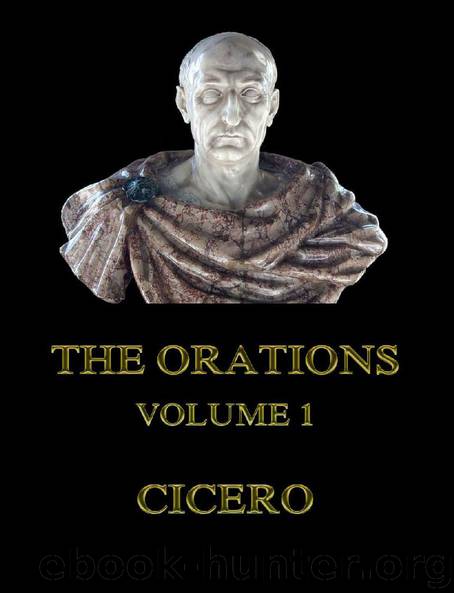The Orations, Volume 1 by Cicero

Author:Cicero [Cicero]
Language: eng
Format: epub
Tags: Philosophie
Publisher: Jazzybee Verlag
Published: 2018-03-13T23:00:00+00:00
THE THIRD BOOK OF THE SECOND PLEADING IN THE ACCUSATION AGAINST CAIUS VERRES.
ON THE COUNT RELATING TO CORN.
THE ARGUMENT.
A great part of this speech is occupied with charges against Verres of extortion committed with respect to the decuriæ or tenths. “The decuriæ formed a part of the vectigalia of the Romans, and were paid by subjects whose territory, either by conquest, or by deditio, had become the property of the state. They consisted, as the name denotes, of a tithe or tenth of the produce of the soil, levied upon the cultivators (aratores) or occupiers (possessores) of the lands; which from being subject to this payment were called agri decumani. It appears from Cicero (c. Verr. act. ii. lib. iii.) that the Romans, on reducing Sicily to a province, allowed to the old inhabitants a continuance of their ancient rights, and that, with some few exceptions, the territory of all the states was subjected, as formerly, to the payment of a tithe on corn, wine, oil, and the ‘fruges minutæ.’ Ref. 128 It was further determined that the place and time of paying these tithes to the decumani should ‘be and continue’ as settled by the law of king Hiero (Lex Hieronica), which enacted severe penalties against any orator who did not pay his due, as well as against the decumani who exacted more than their tenth. The name of decumani was also applied to the farmers of these tributes, who purchased them from the state, and then collected them on their own account.” In fact “the revenues which Rome derived from conquered countries, consisting chiefly of tolls, tithes, harbour duties, &c. were chiefly let out, or, as the Romans expressed it, sold by the censors in Rome itself to the highest bidders, (Cic. c. Verr. ii. iii. 7.) . The tithes raised in the province of Sicily alone, with the exception of those of wine, oil, and garden produce, were not sold at Rome, but in the district of Sicily itself, according to a practice established by Hiero, (Cic. c. Verr. ii. iii. 64, 33.) The persons who undertook the farming of the public revenue, of course, belonged to the wealthiest Romans; and down to the end of the republic, as well as during the earlier part of the empire, the farming of the public revenues was almost exclusively in the hands of the equites, whence the words equites and publicani are sometimes used as synonymous, (Cic. c. Verr. i. 51, 52, 71., . The publicani had to give security to the state for the sum at which they bought one or more branches of the revenue in a province; and as no one person was rich enough to give sufficient security, a number of equites generally united together and formed a company (socii, societas, or corpus) which was ‘recognised by the state, and by which they were enabled to carry on their undertakings on a large scale. The shares which each partner in such a company took in the business were called partes, and if they were small particulæ.
Download
This site does not store any files on its server. We only index and link to content provided by other sites. Please contact the content providers to delete copyright contents if any and email us, we'll remove relevant links or contents immediately.
| Ancient & Classical | Arthurian Romance |
| Beat Generation | Feminist |
| Gothic & Romantic | LGBT |
| Medieval | Modern |
| Modernism | Postmodernism |
| Renaissance | Shakespeare |
| Surrealism | Victorian |
4 3 2 1: A Novel by Paul Auster(11087)
The handmaid's tale by Margaret Atwood(6887)
Giovanni's Room by James Baldwin(5910)
Big Magic: Creative Living Beyond Fear by Elizabeth Gilbert(4744)
Asking the Right Questions: A Guide to Critical Thinking by M. Neil Browne & Stuart M. Keeley(4612)
On Writing A Memoir of the Craft by Stephen King(4233)
Ego Is the Enemy by Ryan Holiday(4013)
Ken Follett - World without end by Ken Follett(3985)
The Body: A Guide for Occupants by Bill Bryson(3843)
Bluets by Maggie Nelson(3736)
Adulting by Kelly Williams Brown(3690)
Guilty Pleasures by Laurell K Hamilton(3607)
Eat That Frog! by Brian Tracy(3537)
White Noise - A Novel by Don DeLillo(3447)
The Poetry of Pablo Neruda by Pablo Neruda(3380)
Alive: The Story of the Andes Survivors by Piers Paul Read(3327)
The Book of Joy by Dalai Lama(3245)
The Bookshop by Penelope Fitzgerald(3242)
Fingerprints of the Gods by Graham Hancock(3233)
